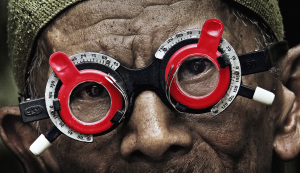By Joseph Pomp.
Festival Premiers Plans d’Angers (literally, First Shots Festival of Angers—a city in northwestern France that more than makes up for its size in charm) is arguably the most important celebration of young filmmakers in Europe. Now in its twenty-seventh year, Premiers Plans boasts a list of alumni that includes some of the best-known names in contemporary European cinema, such as Paolo Sorrentino, Matteo Garrone, Abdellatif Kechiche, and Nuri Bilge Ceylan. While all of those directors showed at the festival very early in their careers, the fact that Arnaud Desplechin had his very first screening there (when his 1991 feature debut La vie des morts showed in competition) demonstrates how essential a role Premiers Plans has played in discovering new talent. It was with the hope of witnessing such a revelation that I traveled to Angers.
Of the five out of fourteen films in competition that I managed to see, the one major accomplishment was Joshua Oppenheimer’s The Look of Silence, a follow-up to his documentary The Act of Killing, which received far-flung accolades upon its theatrical release in 2013. Oppenheimer noted that Look is no more of a companion piece to Act than the other way around, and indeed in hindsight the previous film feels more the B-side, with its self-reflexive emphasis on allowing the subjects to imaginatively re-enact the stories they were telling. The Look of Silence gives a more straightforward approach to the huge, dark chapter in history that both films address: the unthinkable 1965-6 genocide of so-called Communists perpetrated by military-backed guerilla fighters in Indonesia. With the help of one of the half-million victims’ sons (who, like all of the Indonesian crewmembers, remains anonymous out of fear of the current regime, still in fierce denial of the events), Oppenheimer interviews family members of the ringleaders in addition to some of the mass murderers themselves. Some viewers expressed apprehension about scenes in which the filmmakers make the relatives watch footage in which the killers boast about their exploits. But, as Oppenheimer has insisted, this ongoing film project is essentially about impunity, and the families are—remarkably, even less than the perpetrators—unable to take a shred of guilt. Beyond the horror pervading the killers’ proud tales (one anecdote in particular constituting one of the most disturbing scenes I have ever sat through) is a step, if a shaky one, toward acknowledging wrong-doing. The families’ refusal to even hear their patriarchs’ stories makes one wonder how this historical trauma will ever be properly exhumed. For now, one hopes Oppenheimer nobly continues to chip away at its burial ground.
The other competition film to tell a story about a country we rarely see onscreen is The Lesson, from Bulgaria. In the spirit of the Dardenne Brothers, it follows a schoolteacher trying to make ends meet in a society where seemingly everyone is strapped for cash. Her scruples on display in the opening few scenes, in which she tries to make the clandestine student in her class who stole some money from another come clean, gradually fall by the wayside as her own ability to pay outstanding rent honestly seems increasingly unfeasible. While not as didactic as its title might suggest, The Lesson has a similarly targeted objective. It’s the sort of movie that rests almost entirely on the shoulders of its lead actor, and Margita Gosheva isn’t entirely up to the task, playing much of the role with a blank stare. Writer-director team Kristina Grozeva and Petar Vlachanov may be asking for too much, though, as the film drags on for at least twenty minutes more than necessary. It remains to be seen whether they will be able to emulate the Dardennes’ graceful transition from documentary to fiction, but the ambition for a first narrative feature is noteworthy.
A trio of excellent performances anchor L’année prochaine (Next Year), a Belgian film about two girlfriends that leave behind their dull pastoral life in Wallonia to try to make a splash in the university halls of Paris. Julien Boisselier is particularly convincing as the philosophy professor that, in unexpectedly falling for the academic of the two girls, greatly aggravates their incremental drifting apart. Writer-director Vania Leturcq excels at showing how abruptly adolescents on the cusp of adulthood metamorphose. The focus on such a specific passage, though, necessitates some histrionics, and so the film ultimately lacks the distinctive verisimilitude of the other female-driven coming-of-age film in competition, À 14 ans (Being 14), by Hélène Zimmer. All the points of awkwardness and humiliation endemic to growing up in the twenty-first century are on display, such as Facebook photo ‘stalking’, public screaming matches with Mom, and candid conversations amongst peers about sexuality. Zimmer is very young herself, but she must have spent quite a bit of time hanging out with teenagers to capture this level of nuance of their lives. Although the film follows a relatively typical teen movie narrative, following the seasons of the school year, it distinguishes itself with a tapestry-like focalization, moving between characters and parts of their lives seamlessly.
The same couldn’t be said of Vincent, which stars its writer-director Thomas Salvador as the eponymous character, whose lack of direction initially appears to be the result of some very late-stage adolescent angst. That it is in fact a consequence of a special, but dangerous, Icarean talent that he tries to keep hidden introduces an element of whimsy that all the same never fully transcends cliché. The film recovers from its dull-as-a-doorknob beginning once the delightful Vimala Pons (Around a Small Mountain) appears onscreen, as his love interest, but it still remains too driven by its economical plot. Pons’ and Salvador’s chemistry, though, conjures a physicality both of anthropomorphism and invention that makes for breezy cinema.
Given that the student section of the competition has seen the likes of Thomas Vinterberg, I made a point of seeking out a handful of these shorts. The animated films were particularly strong; one, The Bigger Picture, had already been announced as an Academy Award nominee. Another graduation film from the National Film and Television School in England, Port Nasty was particularly affecting. Directed by Rob Zywietz, it presents a cool apocalyptic vision of a whaling boat shipwrecked in an icy land. A minimalist drawing style and elliptical, poetic narrative recall the films of Ruth Lingford. The black-white-blue palette also does much to draw in the viewer, much like the candy shop neon of Nicolas Ménard’s Loop Ring Chop Drink (also made in Britain). His offbeat film about a couple of desperate housemates hanging on for dear life juxtaposes bright colors with dark subject matter in a way that recalls the recent stop motion feature $9.99.
On the live-action side, I caught Black Sheep, a short subject that follows an adolescent member of the English Defense League, an anti-Islamic, nationalist faction, as he takes his younger brother to a rally in the north of England. The protagonist says they are going in order to defend Britain, but his younger brother confesses to not knowing the national anthem, and genuinely seems not to recognize the words “God Save the Queen.” One of the several bizarre details the film captures is that the only flag seen waving at the protest isn’t a Union Jack but that of Israel. The documentary is a modest but powerful statement about the banality of a type of hatred that Europe continues to generate. Cultural imperialism also surfaced, albeit in a vaguely humorous way, in the other live-action short I saw, Onno the Oblivious, Viktor van der Valk’s thesis from the Dutch Film Academy. This narration-driven dramedy about a twentysomething loner confronting both love and death for the first time borrows heavily from Wes Anderson. Excellent art direction and cinematography, liberal with camera whips and punctuated by whimsical sound design, are on display, as is a main character’s mediated, precarious relationship with a racialized other: Onno thinks of his African lover as his own Nala (of The Lion King). If Valk can maintain the verve with more grown-up content, he could be a filmmaker to watch.
Those looking beyond the competition were offered not just a panoply of intriguing works-in-progress and finished pieces by young, not-quite-first filmmakers but also a smattering of classics by established masters. The major retrospectives were dedicated to two very different luminaries of European film comedy, Dino Risi and Bertrand Blier. While the chance to see nearly the complete filmographies of these important directors is wonderful, one can’t help feeling that they make for an unfair pairing with a rich lineup of films by newcomers. Particularly off-putting was the fact that a still from Blier’s Going Places graced all of the promotional material, and his films dominated the festival trailer that played before each film. The perceived need to legitimize the proceedings with Depardieu’s visage became all the more tangible when he in fact showed up to introduce a screening of said film, and the event made local headlines.
The desire (and presumably financial necessity, too) to cater to local tastes might also account for the overarching safeness of the official selection. Every screening I attended was nearly sold out, but the crowds are the students and citizens of Angers, where Premiers Plans is one of the main cultural events of the year. This is certainly not to deny, though, the cinephilia of the audiences, who came out in equally full force for both the light-hearted and the challenging. Within the repertory division, past the glossy front of the retrospective in Blier’s presence, lay an exceptionally creative sidebar entitled “The secret in cinema.” Chronologically spanning from Shadow of a Doubt (Alfred Hitchcock, 1943) to Sister (Ursula Meier, 2012), the series culled together a wide range of films that imaginatively hinge on the undisclosed, whether on the governmental or the interpersonal level. Particularly instructing was the opportunity to see, in close succession and on 35mm, Claude Chabrol’s The Ceremony (1995) and Amos Gitai’s One Day You’ll Understand (2008). The programming forced the viewer to see past two such films’ ostensible dissimilarities and to reflect not on subject matter or stylistics but setting and tone—after all, much more rudimentary components of mise-en-scène. In the case of this double feature, one had the time to linger in family homes, to note the propensity they have for stimulating dread and suspicion, and to marvel at the space they carve out for older women to give tour-de-force performances (Jacqueline Bisset and Jeanne Moreau, respectively).
Difficult as the balancing act between old and new may be, it embodies the great cultural service that Festival Premiers Plans and its ally organizations do not just for France and Europe but, by example, perhaps for the rest of us too. An equal objective, implicit or otherwise, to promoting new voices in filmmaking seems to be providing inspiration to those who may not yet have picked up a camera, and may never, but see cinema as a medium that is always resolutely present, preliminary, and new.
Joseph Pomp is a comparative literature PhD student at Harvard University. He has previously published with Slant Magazine, Senses of Cinema, and The Brooklyn Rail.





